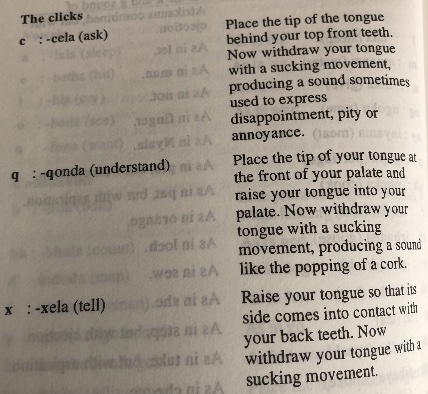Xhosa clicks
« previous post | next post »
[This is a guest post by Don Keyser, retired Foreign Service Officer, in response to "Complex vowels" (8/11/22).]
The mouseover title to the xkcd cartoon in the "Complex vowels" post: "Pronouncing [ṡṡċċḣḣẇẇȧȧ] is easy; you just say it like the 'x' in 'fire'."
This one took me on a ramble down memory lane. I spent the first three months of 1998 leading an inspection of our South African posts — South Africa (Embassy Pretoria, Consulates in Johannesburg, Durban and Capetown); Swaziland; and Lesotho. Majority government — i.e., black-ruled, under President Mandela — had come to South Africa. TV programming featured white hosts speaking Zulu or Xhosa, black hosts speaking English and Afrikaans. In the spirit of the new era. Multilingual signage was seen in the major cities. And so I ventured into a local book store to acquire guides to speaking isiZulu and isiXhosa.
Xhosa is a tonal language (high and low, basically) best known for its "click consonants" — a language introduced to Americans by Miriam Makeba in her "Click Song (Qongqothwane)."
So … perusing the short tourist-type guide to Xhosa* that I bought, I found this delightful "explanation":

* André Viljoen, Antoinette Daniel, Solomzi Madikane, "Molo — Xhosa/English Phrase Book," Juta & Company, Ltd, 1994
Needless to say, full fluency in isiXhosa and isiZulu somehow eluded me.
Selected readings
- "Epiglottal clicks and giant balls of feathers" (11/15/08)
- "Who cares what Zulu has a word for?" (6/12/10)
- "Computing in Zulu" (10/25/04)
Thomas Lee Hutcheson said,
August 19, 2022 @ 8:41 pm
I like the double stop consonants of Amara tt, chch. Actually easier to hear and produce than the rr in Spanish
TonyK said,
August 20, 2022 @ 9:43 am
Are you saying that those descriptions are inadequate? I found them very easy to follow, and was able to produce three quite distinct click sounds.
Peter B. Golden said,
August 20, 2022 @ 12:25 pm
For the interested, one might look at Kabardinian (or other North Caucasian languages) with its wealth of consonants, see John Colarusso, A Grammar of the Kabardinian Language (Calgary: University of Calgary Press , 1992), cf. q, q', x̆, ɣ, qʷ, q'ʷ, x̆ʷ, ɤʷ – and that is just for starters. Georgian has a paltry (unaspirated) k [კ]
(aspirated) k' [ქ] and q' [ყ]. The latter is somewhat akin to Arabic q (ق) and is often used to render it in loans from Arabic, but differs in pronunciation.
Jenny Chu said,
August 20, 2022 @ 9:09 pm
Agree with TonyK – these descriptions are absolutely clear! Love it!
Victor Mair said,
August 21, 2022 @ 12:14 pm
@TonyK, Jenny Chu
It's not so much a question of being able to follow the instructions and produce these sounds. It's whether you can produce the three different clicks in normal speech.
KeithB said,
August 22, 2022 @ 8:06 am
The Click song seems to have been released in 1963, but I would say that "The Gods must be Crazy" also introduced folks to Xhosa.
Terry K. said,
August 22, 2022 @ 11:30 am
How to do the 3rd one (the x) eludes me, but, yeah, overall the difficulty seems to be how to do them in speech.
Angie said,
August 23, 2022 @ 3:29 am
@terryK
that sound is like the one you make when you want a horse to go
or when you are making galloping sounds pretending to be a horse :)
Daniel said,
August 23, 2022 @ 1:28 pm
@Angie
I don't think that's right. It talks about the side of the tone in contact with the back teeth. I find this one easiest to do with a stupid smile on my face. It feels like I'm making fun of someone.
"Mr. Brown Can Moo! Can You?" by Dr. Seuss covers #2 and many other interesting ways to make sound with your mouth.
TonyK said,
August 23, 2022 @ 4:00 pm
@Victor: that's not what Don Keyser was complaining about!
Victor Mair said,
August 24, 2022 @ 7:43 am
It's what I'm concerned about.
Michael Watts said,
August 29, 2022 @ 2:05 am
The dental and lateral clicks are used by English speakers (as the book notes in the case of the dental click).
In my experience, English speakers have no difficulty producing those (of course), but do have difficulty producing a pure alveolar click. When they try, they tend to instead produce one with a lot of lateral airflow, something like a "KL" sound if the K were an alveolar click.
The greater difficulty comes when you try to produce the sound in running speech without awkwardly interrupting yourself. That is a much bigger problem than producing the sound accurately in isolation.